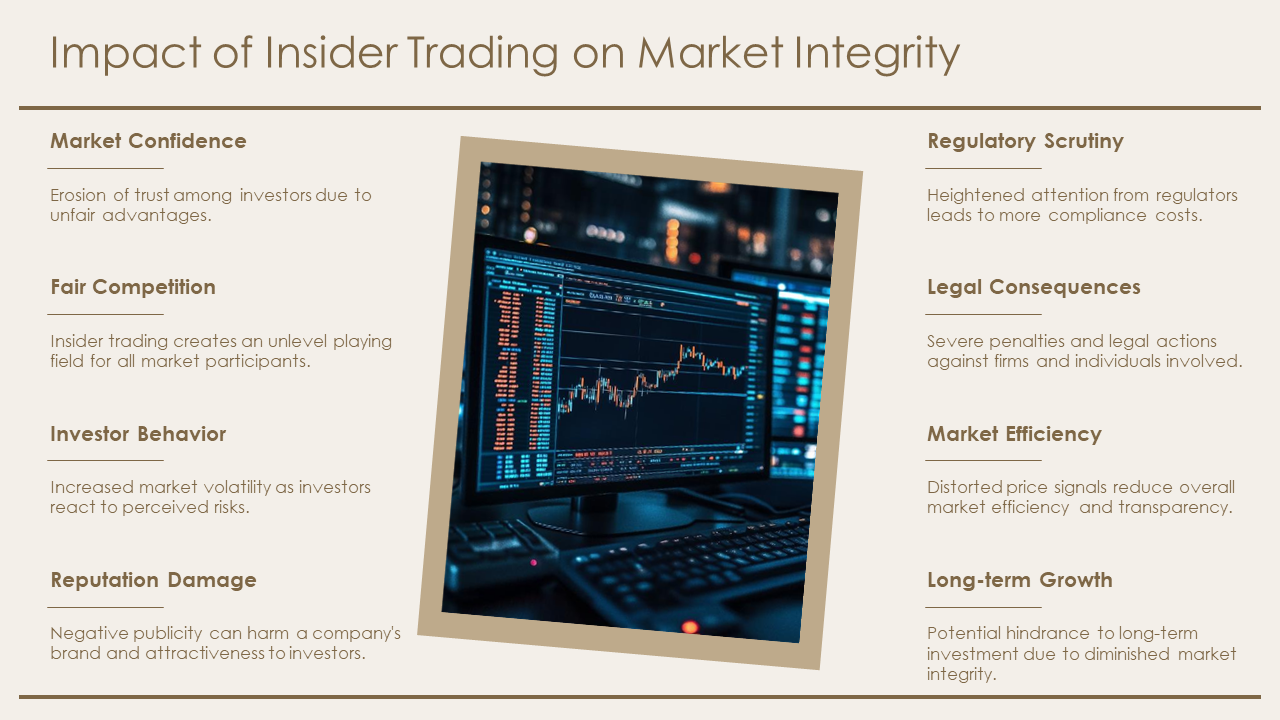Did you know that even a single tweet from a CEO can send stock prices soaring or crashing? Insider trading poses serious risks, especially for day traders navigating the fast-paced markets. This article dives into the intricacies of insider trading, explaining what it is and how it impacts day traders. We’ll explore why it's illegal, the potential legal repercussions, and how authorities detect such activity. Additionally, we’ll discuss the ethical implications, market integrity concerns, and practical steps day traders can take to protect themselves. With insights from DayTradingBusiness, you’ll learn how to stay compliant and avoid the pitfalls of insider trading while maintaining your trading edge.
What is insider trading and how does it affect day traders?
Insider trading is buying or selling stocks based on confidential company information not available to the public. It gives an unfair advantage, leading to illegal profits. For day traders, it creates a risky environment—if they unknowingly trade on inside info, they can face severe legal penalties. It also distorts market fairness, making legitimate trading more unpredictable and volatile.
Why is insider trading considered illegal for day traders?
Insider trading is illegal for day traders because it involves using non-public, material information to gain an unfair advantage, which distorts market fairness. It risks market integrity, undermines investor trust, and can lead to severe legal penalties. For day traders, relying on insider info can result in criminal charges, hefty fines, and account bans, making it a high-risk, illegal practice.
What are the legal risks of engaging in insider trading as a day trader?
Engaging in insider trading as a day trader can lead to severe legal consequences, including hefty fines and criminal charges. Authorities can seize assets and impose prison sentences, sometimes up to 20 years. The legal risks also include damage to your reputation and potential bans from trading or working in financial markets. Even accidental involvement or suspicion can trigger investigations, risking long-term criminal records and civil penalties.
How can authorities detect insider trading among day traders?
Authorities detect insider trading among day traders through surveillance of suspicious trading patterns, such as sudden, unexplained profit spikes or volume surges before major news. They analyze communication records, like encrypted messages or emails, for leaks. They also monitor social media and online forums for hints of confidential info sharing. FBI and SEC use data analytics to flag unusual activities, cross-referencing trade times with news releases. Informants or tips from industry insiders can trigger investigations. Ultimately, they piece together evidence from multiple sources to uncover insider trading schemes.
What penalties do day traders face if caught insider trading?
Day traders caught insider trading face heavy penalties, including hefty fines up to millions of dollars and years in prison. They can also be barred from trading or working in securities. Authorities may seize assets gained from illegal trades and pursue civil charges, increasing financial and legal risks.
How does insider trading impact market integrity and transparency?

Insider trading erodes market integrity by giving insiders unfair advantages, undermining trust among traders. It reduces transparency, making markets appear manipulated or unpredictable. When insiders profit illegally, it discourages honest trading and can lead to market volatility. For day traders, this creates an uneven playing field, increasing risks and decreasing confidence in market fairness.
What are common signs that insider trading might be occurring in day trading?
Sudden, unexplained price movements without news, large trades inconsistent with market trends, and frequent insider rumors hint at insider trading. If someone consistently profits before major news or stock jumps on insider info, that's a red flag. Watch for unusual trading volume around key events and trades that seem timed to upcoming announcements. These signs suggest someone might be using confidential information, posing risks for honest day traders.
Can day traders be unknowingly involved in insider trading?
Yes, day traders can unknowingly get involved in insider trading if they trade based on non-public, material information they receive from sources like friends, coworkers, or online forums. Even without intent, trading on privileged information can be illegal. Regulators scrutinize suspicious trading patterns, so ignorance doesn’t always protect traders from legal consequences.
How does insider trading influence stock prices and market volatility?
Insider trading causes stock prices to rise or fall based on non-public information, creating artificial price movements. It increases market volatility as traders react unpredictably to leaked info, leading to sudden swings. For day traders, this manipulation skews true market signals, making short-term profits riskier and less reliable.
What are the ethical concerns related to insider trading for day traders?

Insider trading for day traders raises ethical concerns like unfair market advantage, undermining market integrity, and harming other investors who lack access to inside information. It erodes trust in financial markets and can lead to legal penalties, damaging reputations and the credibility of trading practices. Using non-public information violates fairness and can distort market prices, creating an uneven playing field.
Learn about Can Insider Trading Be Profitable for Day Traders?
How can day traders protect themselves from legal risks of insider trading?
Day traders can protect themselves from insider trading risks by avoiding non-public, material information and sticking to legal sources like public news and earnings reports. Keep detailed records of all trades and research to prove compliance. Never act on tips from friends, colleagues, or anyone outside official channels. Use reputable trading platforms that monitor for suspicious activity. Stay educated on insider trading laws and regularly review regulations to prevent accidental violations.
Learn about How to Protect Yourself from Insider Trading Risks
What role do brokerage firms play in preventing insider trading?
Brokerage firms monitor transactions for suspicious activity, enforce compliance with insider trading laws, and report suspicious trades to authorities. They implement surveillance systems, conduct employee training, and have policies to detect and prevent illegal trading based on non-public information. Their role is crucial in identifying and stopping insider trading risks that could harm market integrity and day traders.
How does insider trading investigation process work for day traders?

Insider trading investigations for day traders start when authorities gather evidence of trading based on non-public information. Regulators monitor suspicious trades, analyze trading patterns, and review communication records. They may subpoena bank records, emails, and phone logs. If enough evidence surfaces, regulators issue a formal investigation and potentially file charges. Day traders caught up in insider trading face legal action, fines, and bans from trading.
Learn about How Does Insider Trading Affect Day Traders?
What are the financial consequences of insider trading charges?
Insider trading charges can lead to hefty fines, legal fees, and civil penalties. Convictions often result in jail time, damaging your reputation and future trading prospects. You might face asset forfeiture and restrictions on trading activities. The financial fallout can wipe out your savings and limit access to brokerage accounts, making it hard to recover financially.
How can day traders stay compliant with trading regulations to avoid insider trading risks?
Day traders stay compliant by thoroughly understanding securities laws and avoiding non-public, material information. They stick to legitimate trading strategies and steer clear of tips from insiders. Using reputable trading platforms and maintaining detailed trade records helps ensure transparency. Regularly consulting financial regulations and avoiding sudden, large trades based on confidential info reduces insider trading risks. Staying educated on securities laws and ethical standards keeps traders aligned with legal requirements.
Learn about How to Stay Compliant With Day Trading Laws
Conclusion about Risks Linked to Insider Trading for Day Traders
In conclusion, understanding the risks associated with insider trading is crucial for day traders aiming to navigate the complexities of the market legally and ethically. Engaging in insider trading not only poses significant legal consequences but also undermines market integrity. By staying informed and compliant with trading regulations, day traders can protect themselves from potential pitfalls. Leveraging insights from DayTradingBusiness can provide valuable guidance in recognizing the signs of insider trading and maintaining ethical trading practices.
Learn about Preventive Measures Against Insider Trading for Day Traders